广东省深圳市 2015秋七年级英语上册 Module 1 Unit 2 Daily life Grammar 课件
文档属性
| 名称 | 广东省深圳市 2015秋七年级英语上册 Module 1 Unit 2 Daily life Grammar 课件 |  | |
| 格式 | zip | ||
| 文件大小 | 699.4KB | ||
| 资源类型 | 教案 | ||
| 版本资源 | 牛津深圳版 | ||
| 科目 | 英语 | ||
| 更新时间 | 2015-12-24 00:00:00 | ||
图片预览

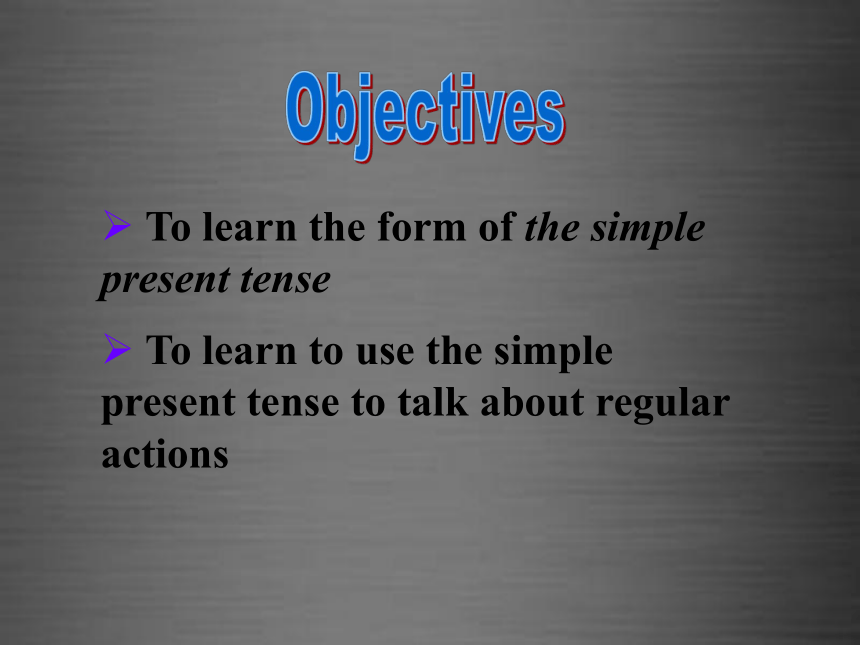
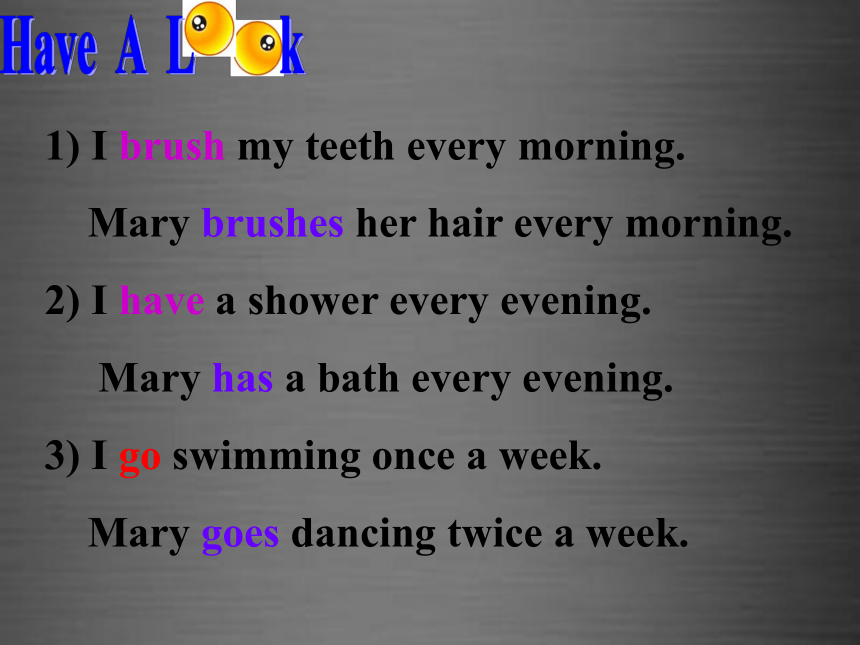
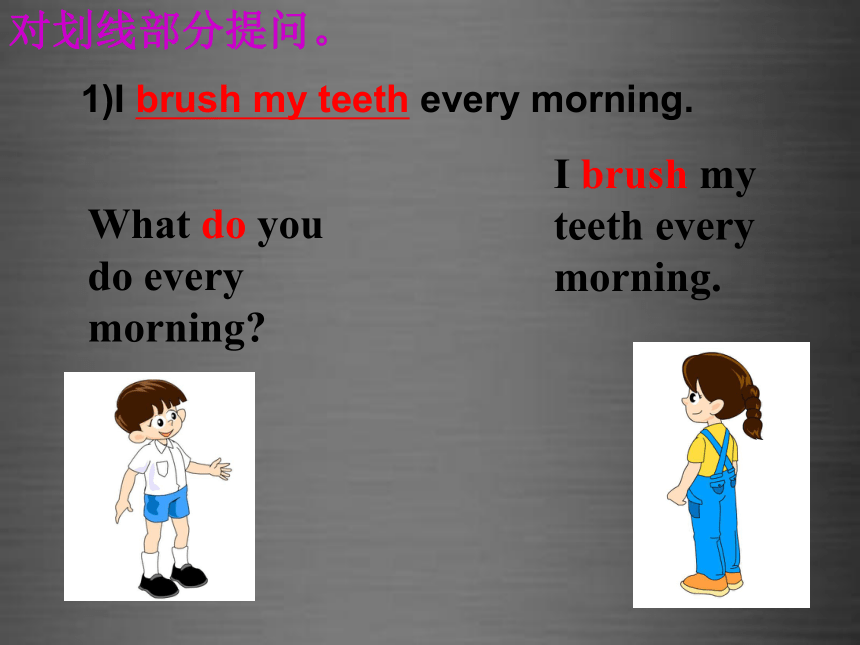
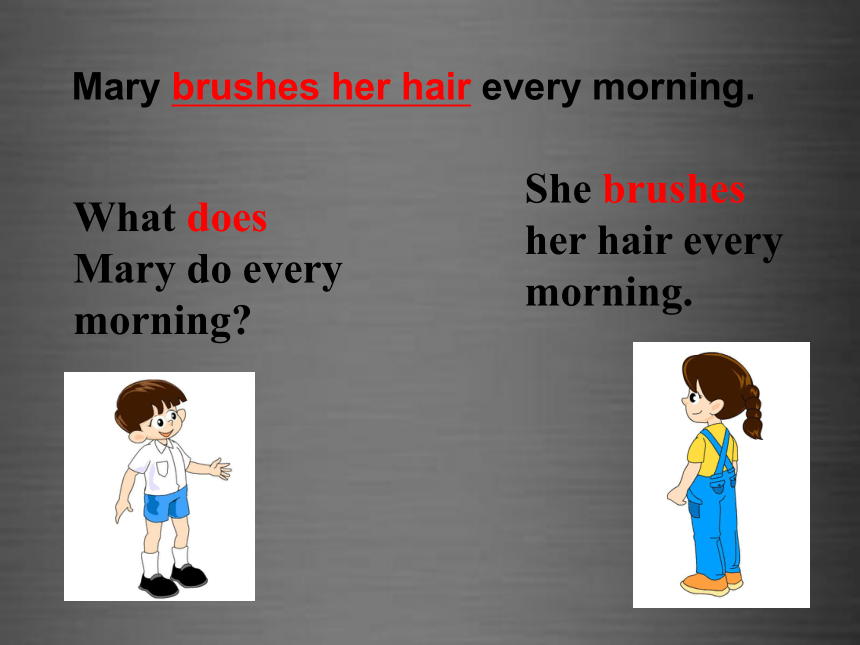
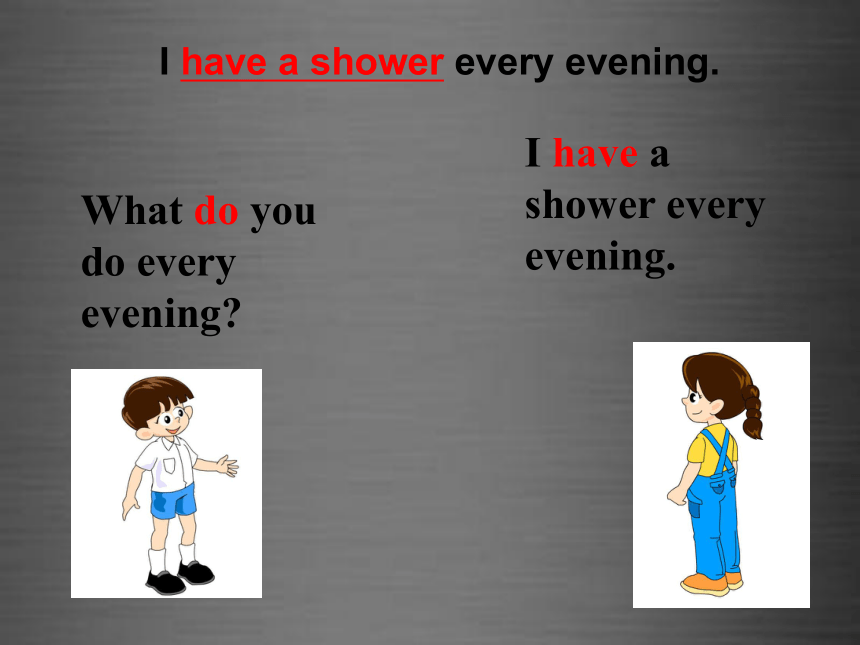
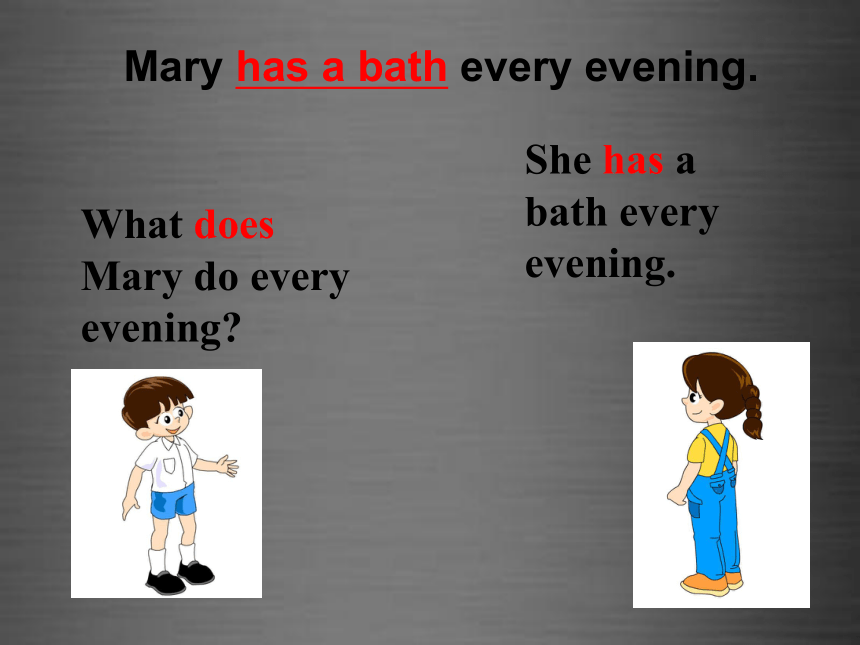
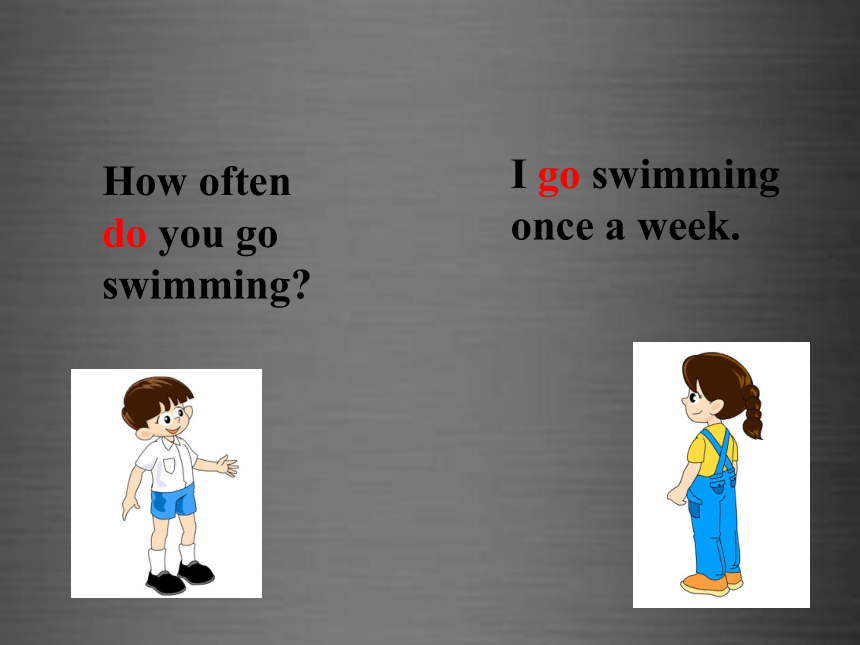
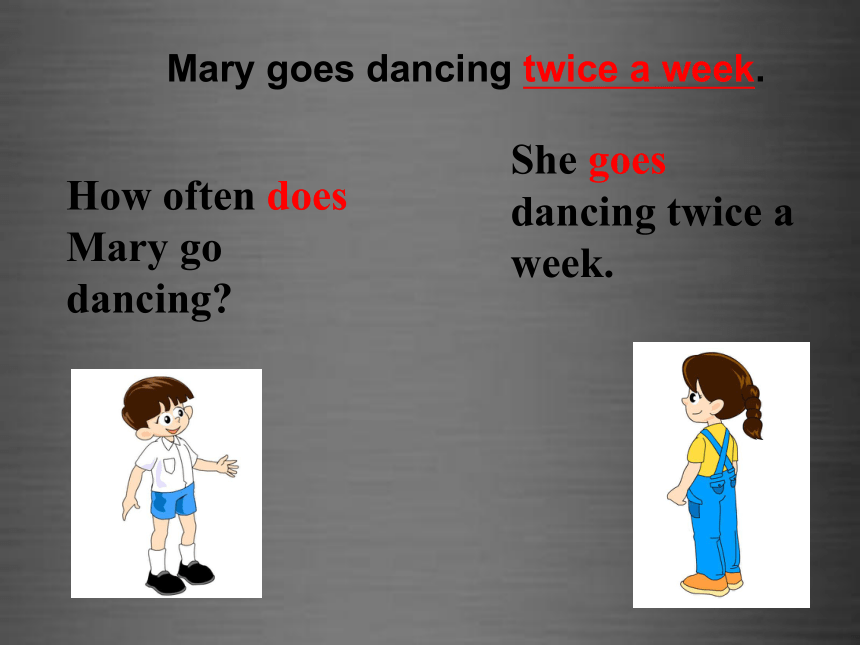
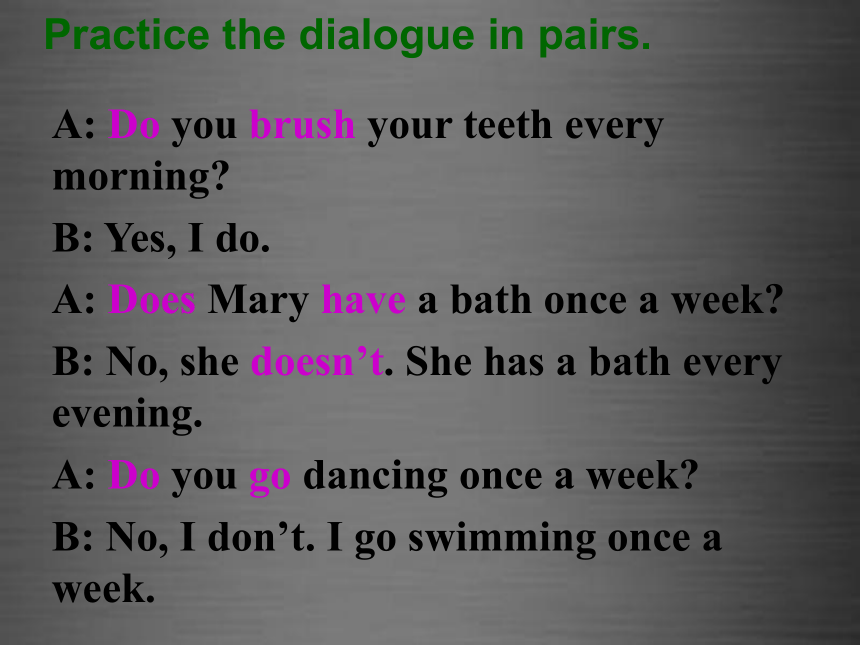
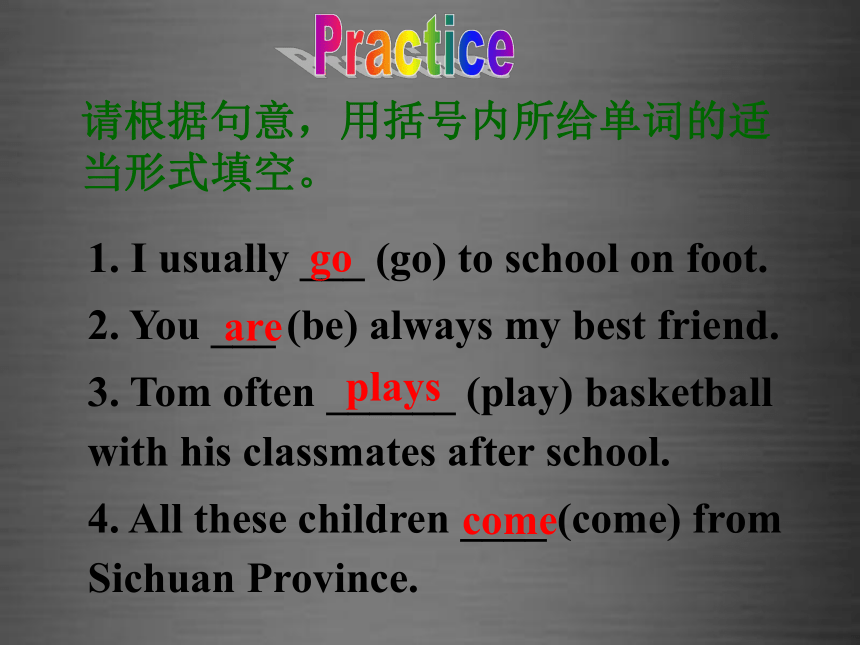
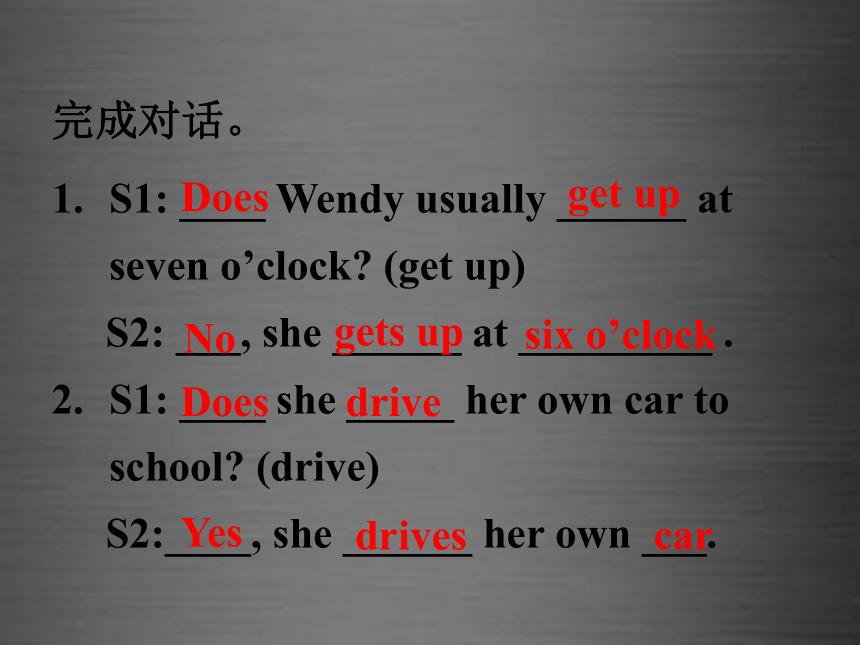
文档简介
课件44张PPT。GrammarObjectives To learn the form of the simple present tense
To learn to use the simple present tense to talk about regular actions I brush my teeth every morning.
Mary brushes her hair every morning.
2) I have a shower every evening.
Mary has a bath every evening.
3) I go swimming once a week.
Mary goes dancing twice a week.对划线部分提问。What do you do every morning?I brush my teeth every morning.I brush my teeth every morning. What does Mary do every morning?She brushes her hair every morning.Mary brushes her hair every morning.
What do you do every evening?I have a shower every evening.I have a shower every evening.Mary has a bath every evening.What does Mary do every evening?She has a bath every evening.How often do you go swimming?I go swimming once a week.How often does Mary go dancing?She goes dancing twice a week.Mary goes dancing twice a week.A: Do you brush your teeth every morning?
B: Yes, I do.
A: Does Mary have a bath once a week?
B: No, she doesn’t. She has a bath every evening.
A: Do you go dancing once a week?
B: No, I don’t. I go swimming once a week.Practice the dialogue in pairs.1. I usually ___ (go) to school on foot.
2. You ___ (be) always my best friend.
3. Tom often ______ (play) basketball with his classmates after school.
4. All these children ____ (come) from Sichuan Province.comegoareplays请根据句意,用括号内所给单词的适当形式填空。PracticeS1: ____ Wendy usually ______ at seven o’clock? (get up)
S2: ___, she ______ at _________ .
S1: ____ she _____ her own car to school? (drive)
S2:____, she ______ her own ___.完成对话。Does get upNo gets upsix o’clockDoes driveYes drivescar3. S1: How often ____ she _____ cakes to her daughter? (make, sometimes)
S2: She ____________ to her daughter __________ .
4. S1: _____ she usually _______ B grades at school? (achieve)
S2: ___, she _______.doesmakemakes cakessome times DoesachieveNo doesn’t5. S1: How often ____she ______ attend Computer Club meetings? (attend, one)
S2: She _______ meetings ____ a week, on Fridays.
6. S1: ____ she _____ violin lessons? (have, two)
S2: ____, she _____ lessons ___________.doesattendattendsonce DoeshaveYes hastwice a week以上我们已经通过归纳总结和练习对本课的语法内容有了一定的了解,下面就让我们根据
之前练习的考察情
况进一步选择讲解
该语法项的重难点。 In statements, we add –s or es to verbs after
he/she/it.
? Some verbs end in -s, -x, -ch or –sh. We add –es to these verbs,
e.g., discusses, mixes, watches, washes.
? We also add –es to verbs like go and do.
? A few verbs end in –y. We sometimes change the –y to –i and add –es,
eg. studies, hurries.The forms of the simple present tenseIn questions, we use ____ before I/you/we/they and _____ before he/she/it.dodoesThe usages of the simple present tense
一般现在时的用法:
经常性或习惯性的动作,常与表示频度的时间状语连用。时间状语:always,
usually, every / night / evening / day, often, sometimes.
I leave home for school at 7 every morning.2) 客观真理,客观存在,科学事实
The earth moves around the sun. Shanghai lies in the east of China.
3) 表示格言或警句中。
Pride goes before a fall.
骄者必败。一般现在时的疑问句形式及回答:
Do I/you/we/they play the guitar?
Yes, I/you/we/they do.
No, I/you/we/they don’t.Does he/she/it play the guitar?
Yes, he/she/it does.
No, he/she/it doesn’t.Adverbs of frequencyalwaysusuallyoftensometimesseldomneverPracticeTalk about the different ways Sam and his classmates go to school, using adverbs of frequency. Follow the example.—Does Kitty usually go to school on foot?
—No, she seldom goes to school on foot. She usually goes to school by bus.Adverbial phrases of frequencyMary tidies her room seven times a week.
Bill tidies his room six times a week. (except Sunday)
Lily tidies her room three times a week. (Monday, Wednesday, Friday)
Sam tidies his room twice a week. (Saturday Sunday)
Mike tidies his room once a week. (Sunday)I. Ask and answer in pairs.A: How often does Mary tidy her room?
B: She tidies it seven times a week.II. More practice.A: Does Mary tidy her room on Mondays?
B: Yes, she does.
A: Does Sam tidy his room on Mondays?
B: No, he doesn’t. He tidies it on Saturdays and Sundays.Tips:
1)once和twice分别表示“一次”和“两次”。两次以上可用“基数词 + times”来表示,如three times, four times, five times.
2)on Mondays 与every Monday 意思相同。Practice请把括号中的副词或短语放在句子中最合适的位置。
1. My father watches TV on Saturday. (usually)
2. What does Helen do at weekends? (often)
3. I don’t like dogs, so I play with them. (never)
4. I’m looking forward to becoming a teacher. (always)
5. The little boy enjoys ice cream. (once a day)
6. She helps her mother do some housework. (every Sunday)Answers:
1. My father watches TV on Saturday. (usually) ________________________ __________________
2. What does Helen do at weekends? (often) __________________________ ___________ My father usually watches TV on Saturday. What does Helen often do at weekends?3. I don’t like dogs, so I play with them. (never) __________________________ ________________
4. I’m looking forward to becoming a teacher. (always) ___________________________ ___________________ I don’t like dogs, so I never play with them.I’m always looking forward to becoming a teacher.5. The little boy enjoys ice cream. (once a day) ___________________________ _____________
6. She helps her mother do some housework. (every Sunday) __________________________________ __________________________________ __________________________________
__________She helps her mother do some housework every Sunday. / Every Sunday she helps her mother do some housework. The little boy enjoys ice cream once a day.Adverbs & adverbial phrases of frequency
1) Adverbs of frequency come _____ (before, after) the main verbs.
2) Adverbial phrases of frequency often come ___________ a sentence. Sometimes they come at the beginning.
beforeat the end ofComplete the conversation below.
S1: _____ Sam ____ (go) to school by bus?
S2: No, he _______. He _____ (go) to school
on foot.
S1: ______ Sam and his friends _____ (play)
games during the morning break?
S2: Yes, they _____.
S1: What _____ Sam ____ (do) after school?
S2: He _______ (take) part in the school
band practice.课本练习Does godoesn’tgoesDo playdodoes dotakesTalk about things. Follow the example.A: Do you go to school by bus?
B: Yes, I do.
A: Does Sam go to school by bus?
B: No, he doesn’t. he goes to school on foot.Study Chinese, Maths and English in the morning
Take part in after-school activities课本练习My chat room
Mandy: How often do you watch television?
Sam: __________________________.
(every night)
Mandy: How often do you eat out?
Sam: _________________. (sometimes)
Mandy: How often do you play table tennis
with your father?I watch television every nightI eat out sometimesp23Sam: ___________________________
______________. (once a week)
Mandy: How often do you win?
Sam: _____________. (seldom)
Mandy: How often do you visit other cities?
Sam: _______________________________.
(four times a year)
Mandy: How often do you play computer
games?
Sam: ___________________________.
(never)I play table tennis with my father once a weekI seldom winI visit other cities four times a yearI never play computer games你来比划我来猜play a game1. 两人为一组,一人比划一人猜。
2. 猜的同学要用How often do you _____ 回答。
3. 每组限时1分钟
(比划的同学不能发声)例如:踢足球Student A (做动作)Student B: How often do you play football? ARE YOU READY?做家务上网看书购物锻炼理发打篮球洗澡看电影游泳放风筝玩游戏画画跳舞do homeworkbrush your teeth (刷牙) cut your hair (理发)
wash your clothes take a shower
clean your room
visit your uncle/grandmother
surf the Internet play computer games
go shopping /do some shopping eat breakfast
arrive late for class eat in the classroom
practice your English watch TV A: How often do you …?
B: once a week/ every day / twice a month
/hardly ever / never / sometimes/…游戏小结Time for reflection The simple present tense
1) In statements, we add ____ or ____ to verbs after he/ she/ it.
2) In questions, we use ______ before I/you/we/they and _____before he/she/it.
2. Adverbs & adverbial phrases of frequency
1) Adverbs of frequency come _____ (before, after) the main verbs.
2) Adverbial phrases of frequency often come ______ of a sentences.1. If my friends have any problems, my door is ______ open to them. (2014 安徽)
A. never B. seldom
C. sometimes D. always
2. —What do you often do at weekends?
—I often _________ my grandparents. (2014 北京) A. visit B. visited
C. have visited D. will visitI. Multiple choice3. A Bite of China 2 includes eight episodes. It the stories of more than 150 people and over 300 types of food. (连云港)
finds B. proves
C. covers D. imagines4. —What does your mother do?
—________. (2014 达州)
A. She does the housework B. She is a nurse
C. She is very thin D. She looks very young5. ——How often do you go skating?
——________.I can’t skate at all. (2014 温州)
A.Always B.Sometimes
C.Seldom D.NeverⅡ. 根据情景及所给提示,补全对话。A: Do you (1)_____(know) Sandra Clark?
B: You mean (指……) the sports star?
A: Yes. The sports star Sandra.
B: Yes, I know a lot about her. She (2)_______(eat)
lots of healthy food.
A: Really? What (3)_____________(she / have) for
breakfast?
B: She likes eggs, bananas and apples.
A: What about lunch?
B: She (4)________(like) hamburgers, salad and
oranges for lunch.
A: And dinner?
B: She often has chicken, tomatoes, fish and soup.
A: (5)_____________(she/eat) any dessert (甜食)?
B: Yes, she has ice cream.knoweatsdoes she havelikesDoes she eatIII. 根据汉语提示,完成以下各题。
1. Millie does some housework ____________ (一月两次).
2. Mr Smith _____________(一直很忙) these days. He has no time to come.
3. My cousin ____________(很少吃) meat for dinner.
4. — Do you ________(经常去) to Shenzhen?
— No, I don’t go very often.
5. _______________(每周六), Mike plays basketball with his good friends, Jill and Paul.twice a monthis always busyseldom eatsoften goEvery SaturdayHomeworkReview the simple present tense.
Write ten sentences about your daily life. You can use the simple present tense.
Preview Speaking on Page 24.
To learn to use the simple present tense to talk about regular actions I brush my teeth every morning.
Mary brushes her hair every morning.
2) I have a shower every evening.
Mary has a bath every evening.
3) I go swimming once a week.
Mary goes dancing twice a week.对划线部分提问。What do you do every morning?I brush my teeth every morning.I brush my teeth every morning. What does Mary do every morning?She brushes her hair every morning.Mary brushes her hair every morning.
What do you do every evening?I have a shower every evening.I have a shower every evening.Mary has a bath every evening.What does Mary do every evening?She has a bath every evening.How often do you go swimming?I go swimming once a week.How often does Mary go dancing?She goes dancing twice a week.Mary goes dancing twice a week.A: Do you brush your teeth every morning?
B: Yes, I do.
A: Does Mary have a bath once a week?
B: No, she doesn’t. She has a bath every evening.
A: Do you go dancing once a week?
B: No, I don’t. I go swimming once a week.Practice the dialogue in pairs.1. I usually ___ (go) to school on foot.
2. You ___ (be) always my best friend.
3. Tom often ______ (play) basketball with his classmates after school.
4. All these children ____ (come) from Sichuan Province.comegoareplays请根据句意,用括号内所给单词的适当形式填空。PracticeS1: ____ Wendy usually ______ at seven o’clock? (get up)
S2: ___, she ______ at _________ .
S1: ____ she _____ her own car to school? (drive)
S2:____, she ______ her own ___.完成对话。Does get upNo gets upsix o’clockDoes driveYes drivescar3. S1: How often ____ she _____ cakes to her daughter? (make, sometimes)
S2: She ____________ to her daughter __________ .
4. S1: _____ she usually _______ B grades at school? (achieve)
S2: ___, she _______.doesmakemakes cakessome times DoesachieveNo doesn’t5. S1: How often ____she ______ attend Computer Club meetings? (attend, one)
S2: She _______ meetings ____ a week, on Fridays.
6. S1: ____ she _____ violin lessons? (have, two)
S2: ____, she _____ lessons ___________.doesattendattendsonce DoeshaveYes hastwice a week以上我们已经通过归纳总结和练习对本课的语法内容有了一定的了解,下面就让我们根据
之前练习的考察情
况进一步选择讲解
该语法项的重难点。 In statements, we add –s or es to verbs after
he/she/it.
? Some verbs end in -s, -x, -ch or –sh. We add –es to these verbs,
e.g., discusses, mixes, watches, washes.
? We also add –es to verbs like go and do.
? A few verbs end in –y. We sometimes change the –y to –i and add –es,
eg. studies, hurries.The forms of the simple present tenseIn questions, we use ____ before I/you/we/they and _____ before he/she/it.dodoesThe usages of the simple present tense
一般现在时的用法:
经常性或习惯性的动作,常与表示频度的时间状语连用。时间状语:always,
usually, every / night / evening / day, often, sometimes.
I leave home for school at 7 every morning.2) 客观真理,客观存在,科学事实
The earth moves around the sun. Shanghai lies in the east of China.
3) 表示格言或警句中。
Pride goes before a fall.
骄者必败。一般现在时的疑问句形式及回答:
Do I/you/we/they play the guitar?
Yes, I/you/we/they do.
No, I/you/we/they don’t.Does he/she/it play the guitar?
Yes, he/she/it does.
No, he/she/it doesn’t.Adverbs of frequencyalwaysusuallyoftensometimesseldomneverPracticeTalk about the different ways Sam and his classmates go to school, using adverbs of frequency. Follow the example.—Does Kitty usually go to school on foot?
—No, she seldom goes to school on foot. She usually goes to school by bus.Adverbial phrases of frequencyMary tidies her room seven times a week.
Bill tidies his room six times a week. (except Sunday)
Lily tidies her room three times a week. (Monday, Wednesday, Friday)
Sam tidies his room twice a week. (Saturday Sunday)
Mike tidies his room once a week. (Sunday)I. Ask and answer in pairs.A: How often does Mary tidy her room?
B: She tidies it seven times a week.II. More practice.A: Does Mary tidy her room on Mondays?
B: Yes, she does.
A: Does Sam tidy his room on Mondays?
B: No, he doesn’t. He tidies it on Saturdays and Sundays.Tips:
1)once和twice分别表示“一次”和“两次”。两次以上可用“基数词 + times”来表示,如three times, four times, five times.
2)on Mondays 与every Monday 意思相同。Practice请把括号中的副词或短语放在句子中最合适的位置。
1. My father watches TV on Saturday. (usually)
2. What does Helen do at weekends? (often)
3. I don’t like dogs, so I play with them. (never)
4. I’m looking forward to becoming a teacher. (always)
5. The little boy enjoys ice cream. (once a day)
6. She helps her mother do some housework. (every Sunday)Answers:
1. My father watches TV on Saturday. (usually) ________________________ __________________
2. What does Helen do at weekends? (often) __________________________ ___________ My father usually watches TV on Saturday. What does Helen often do at weekends?3. I don’t like dogs, so I play with them. (never) __________________________ ________________
4. I’m looking forward to becoming a teacher. (always) ___________________________ ___________________ I don’t like dogs, so I never play with them.I’m always looking forward to becoming a teacher.5. The little boy enjoys ice cream. (once a day) ___________________________ _____________
6. She helps her mother do some housework. (every Sunday) __________________________________ __________________________________ __________________________________
__________She helps her mother do some housework every Sunday. / Every Sunday she helps her mother do some housework. The little boy enjoys ice cream once a day.Adverbs & adverbial phrases of frequency
1) Adverbs of frequency come _____ (before, after) the main verbs.
2) Adverbial phrases of frequency often come ___________ a sentence. Sometimes they come at the beginning.
beforeat the end ofComplete the conversation below.
S1: _____ Sam ____ (go) to school by bus?
S2: No, he _______. He _____ (go) to school
on foot.
S1: ______ Sam and his friends _____ (play)
games during the morning break?
S2: Yes, they _____.
S1: What _____ Sam ____ (do) after school?
S2: He _______ (take) part in the school
band practice.课本练习Does godoesn’tgoesDo playdodoes dotakesTalk about things. Follow the example.A: Do you go to school by bus?
B: Yes, I do.
A: Does Sam go to school by bus?
B: No, he doesn’t. he goes to school on foot.Study Chinese, Maths and English in the morning
Take part in after-school activities课本练习My chat room
Mandy: How often do you watch television?
Sam: __________________________.
(every night)
Mandy: How often do you eat out?
Sam: _________________. (sometimes)
Mandy: How often do you play table tennis
with your father?I watch television every nightI eat out sometimesp23Sam: ___________________________
______________. (once a week)
Mandy: How often do you win?
Sam: _____________. (seldom)
Mandy: How often do you visit other cities?
Sam: _______________________________.
(four times a year)
Mandy: How often do you play computer
games?
Sam: ___________________________.
(never)I play table tennis with my father once a weekI seldom winI visit other cities four times a yearI never play computer games你来比划我来猜play a game1. 两人为一组,一人比划一人猜。
2. 猜的同学要用How often do you _____ 回答。
3. 每组限时1分钟
(比划的同学不能发声)例如:踢足球Student A (做动作)Student B: How often do you play football? ARE YOU READY?做家务上网看书购物锻炼理发打篮球洗澡看电影游泳放风筝玩游戏画画跳舞do homeworkbrush your teeth (刷牙) cut your hair (理发)
wash your clothes take a shower
clean your room
visit your uncle/grandmother
surf the Internet play computer games
go shopping /do some shopping eat breakfast
arrive late for class eat in the classroom
practice your English watch TV A: How often do you …?
B: once a week/ every day / twice a month
/hardly ever / never / sometimes/…游戏小结Time for reflection The simple present tense
1) In statements, we add ____ or ____ to verbs after he/ she/ it.
2) In questions, we use ______ before I/you/we/they and _____before he/she/it.
2. Adverbs & adverbial phrases of frequency
1) Adverbs of frequency come _____ (before, after) the main verbs.
2) Adverbial phrases of frequency often come ______ of a sentences.1. If my friends have any problems, my door is ______ open to them. (2014 安徽)
A. never B. seldom
C. sometimes D. always
2. —What do you often do at weekends?
—I often _________ my grandparents. (2014 北京) A. visit B. visited
C. have visited D. will visitI. Multiple choice3. A Bite of China 2 includes eight episodes. It the stories of more than 150 people and over 300 types of food. (连云港)
finds B. proves
C. covers D. imagines4. —What does your mother do?
—________. (2014 达州)
A. She does the housework B. She is a nurse
C. She is very thin D. She looks very young5. ——How often do you go skating?
——________.I can’t skate at all. (2014 温州)
A.Always B.Sometimes
C.Seldom D.NeverⅡ. 根据情景及所给提示,补全对话。A: Do you (1)_____(know) Sandra Clark?
B: You mean (指……) the sports star?
A: Yes. The sports star Sandra.
B: Yes, I know a lot about her. She (2)_______(eat)
lots of healthy food.
A: Really? What (3)_____________(she / have) for
breakfast?
B: She likes eggs, bananas and apples.
A: What about lunch?
B: She (4)________(like) hamburgers, salad and
oranges for lunch.
A: And dinner?
B: She often has chicken, tomatoes, fish and soup.
A: (5)_____________(she/eat) any dessert (甜食)?
B: Yes, she has ice cream.knoweatsdoes she havelikesDoes she eatIII. 根据汉语提示,完成以下各题。
1. Millie does some housework ____________ (一月两次).
2. Mr Smith _____________(一直很忙) these days. He has no time to come.
3. My cousin ____________(很少吃) meat for dinner.
4. — Do you ________(经常去) to Shenzhen?
— No, I don’t go very often.
5. _______________(每周六), Mike plays basketball with his good friends, Jill and Paul.twice a monthis always busyseldom eatsoften goEvery SaturdayHomeworkReview the simple present tense.
Write ten sentences about your daily life. You can use the simple present tense.
Preview Speaking on Page 24.
